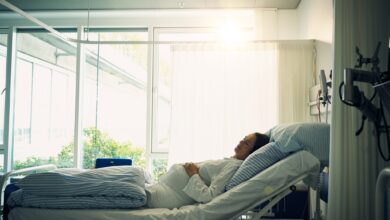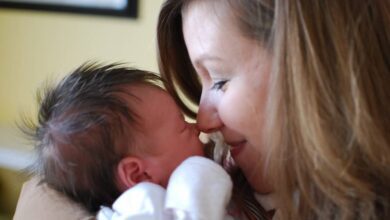When Can I Get Pregnant After My Period? Understanding the Menstrual Cycle and Maximizing Fertility

Many women who are trying to conceive wonder when they can get pregnant after their period. Although pregnancy is most likely to occur during the fertile window, which includes the days leading up to and including the day of ovulation, it is also possible to get pregnant at other times during the menstrual cycle. So, we’ll explore the factors that affect a woman’s ability to get pregnant after her period and discuss the best ways to maximize your chances of getting pregnant.
Understanding the Menstrual Cycle
Understanding the menstrual cycle is important in determining when a woman can become pregnant after the last day of her period. The monthly hormonal cycle prepares a woman’s body for pregnancy. It is regulated by a complex interplay of hormones, including estrogen and progesterone.
A menstrual cycle usually lasts about 28 days, although it can be longer, shorter, or irregular for some women. In this cycle there are three phases: the follicular phase, the ovulatory phase, and the luteal phase.
The follicular phase begins on the first day of your period. At this stage, the ovaries begin to develop follicles, each containing an egg. These follicles produce estrogen, which thickens the lining of the uterus in preparation for possible pregnancy.
The ovulatory phase occurs on the 14th day of the menstrual cycle (although this can vary). At this stage, one of the follicles will release an egg, which will travel down the fallopian tube. This is called ovulation, and it is the most fertile time in a woman’s menstrual cycle. If the mature egg meets sperm during this time, it can be fertilized with a high chance of pregnancy.
The luteal phase begins after ovulation and lasts until the start of the next period. At this stage, the ruptured follicle that released the egg forms a structure called the corpus luteum. The corpus luteum produces progesterone, which helps thicken and prepare the uterine lining for implantation of a fertilized egg.
If fertilization does not occur, the corpus luteum will eventually break down, and the menstrual cycle will begin again with the shedding of the lining of the uterus.
It is important to remember that the length and regularity of the menstrual cycle can vary from woman to woman and even from cycle to cycle. Factors such as stress, illness, and medication can affect the timing of ovulation and the start of the next period. Additionally, some women may experience irregular cycles due to conditions such as polycystic ovary syndrome (PCOS) or thyroid disorders.
You need to understand the basics of your menstrual cycle and track your fertility, so you can better predict when you’re most likely to get pregnant after your period. Methods such as basal body temperature tracking or ovulation predictor kits can help determine your fertile window and assist with timed intercourse.
When Can You Get Pregnant After Your Period?
Although the exact time of ovulation varies from woman to woman depending on the length of your cycle, it is generally true that the fertile window occurs about 12-16 days before the start of the next period. This means that for a woman with a 28-day cycle, ovulation will most likely occur on the 14th day. Remember that live sperm can survive inside the female reproductive tract for up to five days. This means that it is possible to get pregnant especially if you had unprotected sex a few days before ovulation.
In addition, some women may have irregular cycle lengths or experience ovulation at different times each month, making it more difficult to predict exactly when ovulation will occur. In these cases, it may be helpful to track your menstrual cycle and ovulation using methods such as basal body temperature tracking or ovulation predictor kit to get a positive result.
Factors Affecting Fertility
Many factors can affect a woman’s fertility and her ability to get pregnant after her period. This includes:
- Age: As women age, their fertility declines, and the chance of getting pregnant naturally decreases as well.
- Health conditions: Certain medical conditions such as polycystic ovary syndrome (PCOS) or endometriosis can affect a woman’s fertility and limit a good chance of getting pregnant.
- Lifestyle factors: Habits such as smoking, excessive alcohol consumption, and poor diet can affect a woman’s fertility and make pregnancy more difficult.
- Stress: High levels of stress can affect a woman’s hormonal balance and make pregnancy more difficult.
.
Maximize Your Chances of Getting Pregnant

If you’re trying to get pregnant, there are a few things you can do to increase your chances of getting pregnant after your period. This includes:
- Have sex during your fertile window: As mentioned earlier, fertile days are the period of time when you are most likely to get pregnant. By having sex during this time, you can increase your chances of getting pregnant.
- Have a clean lifestyle: Eating a healthy diet, exercising regularly, and avoiding habits like smoking and excessive alcohol consumption can help improve your fertility and increase your chances of getting pregnant.
- Manage stress: relieve stress, through exercise, meditation, or therapy, to help balance your hormones and improve your fertility.
- Track your menstrual cycle: Through tracking your menstrual cycle using methods like basal body temperature tracking or ovulation predictor kits, you can determine your fertile period and the best time for intercourse accordingly.
- Consider seeking medical advice: If you’ve been trying to conceive for several months without success, it may be a good idea to talk to your fertility specialist about potential fertility issues and treatment options for a better chance of pregnancy.
Conclusion
While there’s no guaranteed time when you’ll get pregnant after your period, understanding the basics of the menstrual cycle and tracking your fertility can help maximize your chances of getting pregnant. Remember that fertility can be affected by a variety of factors, including age, health conditions, lifestyle factors, and stress. By adopting healthy habits and seeking medical advice from a family doctor when needed, you can increase your chances of successfully getting pregnant and starting a family.
To all the mothers reading this article, I want to acknowledge the effort and love you put into raising your children. The first step is to understand that the journey to motherhood can be difficult and emotional, especially for those who struggle to conceive. It is important to remember that every woman’s journey to motherhood is unique, and there is no right or wrong way to be a mother.
If you are trying to conceive, I hope this article has provided you with useful information and guidance. Remember that many factors can affect your fertility, and it’s important to take care of yourself physically and mentally as you navigate this journey. Do not hesitate to seek medical advice if you are having trouble conceiving, as there are many treatment options available.

Whether you are a mother or still trying to conceive and conceive, know that you are strong, resilient, and capable of facing any challenge that comes your way. May you find joy and fulfillment in your motherhood journey, and may your children bring you endless love and happiness.
Remember to also prioritize self-care, like having a relaxing Sunday, and give yourself compassion as you navigate the ups and downs of motherhood. It’s important to take time for yourself and ask for help when you need it, whether it’s from your partner, family member, or friend. Being a mom can be rewarding and exhausting, and it’s okay to admit that you need support.
Additionally, know that there are many resources available to mothers, from parenting classes to online support groups. Don’t be afraid to reach out and connect with other moms who may be going through a similar experience. Building a community of support can help you feel less alone and more empowered as you navigate the challenges of motherhood.
Finally, remember that there is no “right” way to be a mother. Every family is unique, and what works for one family may not work for another. Trust your gut, stay true to your values, and don’t be too hard on yourself. You’re doing everything you can to get pregnant, and that’s enough.





